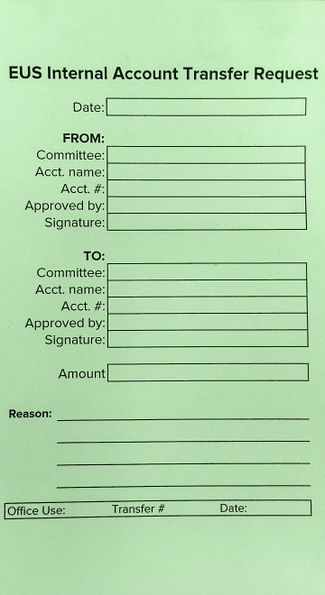Difference between revisions of "Internal Transfer"
Malcolmmcc (talk | contribs) |
m (Fixed a grammatical error. You're -> your) |
||
| Line 1: | Line 1: | ||
{{FinanceBar}} | {{FinanceBar}} | ||
Often you will find that it is necessary to transfer money between EUS groups. This is a fairly simple process. You will find a green internal transfer slip in the [[EUS Office]] in the same rack where you find [[Cheque Requisitions|cheque req]] forms. See an example of the form below. Simply fill out the indicated fields and put it in the cheque req mailbox. The form must have the signatures of the [[Financial Officers|financial officers]] of the groups involved in the transfer. So don’t try to transfer the [[VP Finance]] budget away from me unless I agree to it!<br>[[File:internaltransfer.jpg|325px|frameless|right]] | Often you will find that it is necessary to transfer money between EUS groups. This is a fairly simple process. You will find a green internal transfer slip in the [[EUS Office]] in the same rack where you find [[Cheque Requisitions|cheque req]] forms. See an example of the form below. Simply fill out the indicated fields and put it in the cheque req mailbox. The form must have the signatures of the [[Financial Officers|financial officers]] of the groups involved in the transfer. So don’t try to transfer the [[VP Finance]] budget away from me unless I agree to it!<br>[[File:internaltransfer.jpg|325px|frameless|right]] | ||
| − | Try to be tactful with the accounts which you choose to transfer funds from. If you paid for all the food for an event and you want to transfer half the food cost to the group you ran the event with, you should transfer out of your expense account into their expense account. You might have been tempted to mark the transfer of funds in your revenue account, but this would not be accurate – you are reducing an expense, not gaining a revenue, even though both have the same effect. <br><center style="font-weight:bold; font-size:16px;color:#006400;">{{pull quote|Don't make the mistake of transferring to | + | Try to be tactful with the accounts which you choose to transfer funds from. If you paid for all the food for an event and you want to transfer half the food cost to the group you ran the event with, you should transfer out of your expense account into their expense account. You might have been tempted to mark the transfer of funds in your revenue account, but this would not be accurate – you are reducing an expense, not gaining a revenue, even though both have the same effect. <br><center style="font-weight:bold; font-size:16px;color:#006400;">{{pull quote|Don't make the mistake of transferring to your revenue account when splitting an expense.}}</center> |
===''Scenario''=== | ===''Scenario''=== | ||
:There are some other implications to this rule. Say group A and B run an event, but A handles the money during the event. $2000 in revenue get deposited into Group A’s accounts, and $1000 in expenses get charged against them. You might be tempted to just transfer $500 in profit to Group B from Group A, but the proper thing to do is to transfer $500 in expenses and $1000 in revenues, so that you get the same effect, but things are clearer in the books. | :There are some other implications to this rule. Say group A and B run an event, but A handles the money during the event. $2000 in revenue get deposited into Group A’s accounts, and $1000 in expenses get charged against them. You might be tempted to just transfer $500 in profit to Group B from Group A, but the proper thing to do is to transfer $500 in expenses and $1000 in revenues, so that you get the same effect, but things are clearer in the books. | ||
Revision as of 13:49, 26 April 2018
Try to be tactful with the accounts which you choose to transfer funds from. If you paid for all the food for an event and you want to transfer half the food cost to the group you ran the event with, you should transfer out of your expense account into their expense account. You might have been tempted to mark the transfer of funds in your revenue account, but this would not be accurate – you are reducing an expense, not gaining a revenue, even though both have the same effect.
| “ | Don't make the mistake of transferring to your revenue account when splitting an expense. | ” |
Scenario
- There are some other implications to this rule. Say group A and B run an event, but A handles the money during the event. $2000 in revenue get deposited into Group A’s accounts, and $1000 in expenses get charged against them. You might be tempted to just transfer $500 in profit to Group B from Group A, but the proper thing to do is to transfer $500 in expenses and $1000 in revenues, so that you get the same effect, but things are clearer in the books.
An example of a transfer slip can be seen to the right:
